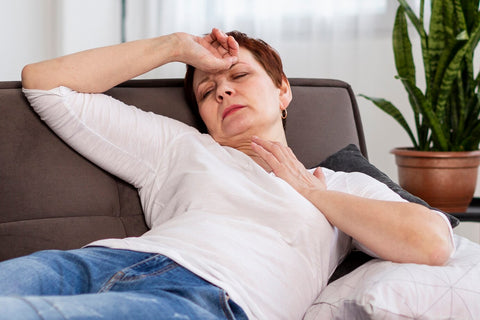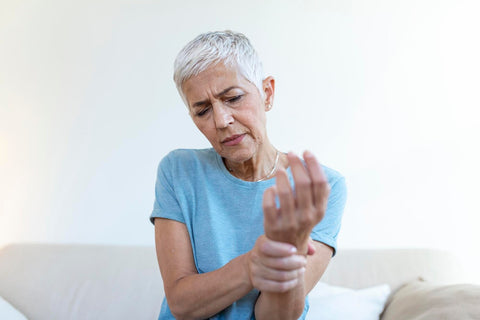Tiredness and fatigue during menopause are one of its symptoms and are a consequence of the combination of others during this stage.
One of the most common symptoms at this stage is tiredness and fatigue ; the symptoms that appear with the arrival of menopause, together with hormonal and emotional changes, cause women to experience extreme tiredness during these years that can interfere with daily activities.
Why are we more tired?
Menopause is a natural stage in a woman's life that occurs when the ovaries stop releasing eggs and sex hormones and the end of a woman's fertile life occurs, resulting in a decrease in the main sex hormones in women.
In addition to the end of menstrual cycles as a result of the non-release of eggs, there are a number of other symptoms caused by the hormonal decline, since estrogen in particular participates in many functions of the body, so its decrease affects the entire body, causing hot flashes, insomnia, irritability, vaginal dryness, etc.
Occasional fatigue is not a problem, but if it becomes habitual it can affect our daily lives, so it is something we should not ignore.
Some causes
Hormonal changes : During menopause, levels of hormones, such as estrogen and progesterone , decrease significantly. These hormones play an important role in regulating sleep and energy. Reduced hormone levels can affect sleep quality, leading to daytime fatigue.
Hot flashes and night sweats : Hot flashes are sudden episodes of intense heat that mainly affect the upper part of the body, and may be accompanied by sweating that can disrupt sleep and affect the quality of rest.
Changes in metabolism and body composition : With menopause, many women experience changes in metabolism and body fat distribution, which can affect energy and feelings of fatigue.
Stress and anxiety: Menopause can be a stressful and emotionally challenging time for some women, as it involves a significant transition and changes in daily life. Stress and anxiety can affect sleep quality and contribute to fatigue.
Changes in physical activity and lifestyle : Some women may experience a decrease in physical activity or lifestyle changes during menopause, which can also influence feelings of tiredness and fatigue.
Hormones
Fatigue in women during menopause is mainly due to the hormonal imbalance of this stage, which leaves the body without energy, although this does not occur in all women.
If progesterone is too low, what is called estrogen dominance occurs, causing fatigue, and on the other hand, low testosterone is another cause of fatigue, slowness and muscle weakness. This can lead to women having low levels of dopamine and serotonin , which are two neurotransmitters responsible for good mood.
Another hormone that affects our energy levels is insulin (a hormone involved in sugar metabolism) and specifically insulin resistance, which is also another characteristic of this stage. Eating foods that raise insulin levels produces a need for more glucose at the cellular level and a resistance of the cellular response to its metabolism, so it cannot obtain as much energy from it.
There is, in general, less ability to cope with physical and emotional stress and also less ability to play sports, because there are fewer anabolic hormones in the body.
In many cases, this situation usually occurs in women who are subjected to very demanding jobs or sports or stressful family situations, with exacerbated self-critical thinking that negatively impacts the release of cortisol . This situation interrupts the natural production of the main female hormones in the metabolism and immune system, generating a negative impact on the absorption of nutrients.
The lack of absorption of essential nutrients such as iron, magnesium, or B vitamins is crucial for optimal energy and metabolic health by the liver, which is closely related to hormonal and digestive metabolism. This means that it is not only necessary to eat correctly, but also to absorb all the nutrients we need.
How can you combat fatigue?
Sleep more and better . The key to not feeling tired is to rest at night. If you have trouble sleeping, you should avoid heavy dinners and include foods with tryptophan that help you fall asleep, such as milk, bananas, turkey, chicken, fish or eggs.
Practice relaxation and meditation techniques , go to bed at the same time every day, avoid caffeine in the afternoon, stimulating drinks and tobacco. Valerian or lemon balm infusions will be of great help.
Optimize . There is nothing better to relieve stress than not trying to get everything done or do everything in one day. Organize and optimize so you are not so tired at the end of the day.
You, You and You …. Spend more time on yourself. If your tiredness is mainly mental, spend a little time every day just for yourself, without worries, stress or obligations… A walk, reading a book or listening to quiet music helps you relax…. You will relieve stress and worries, and you will feel calmer and less tired.
Practice physical exercise regularly . Although it may not seem like it, physical exercise does not make us more tired, but rather helps us feel better, with more strength and energy and lifts our mood. If you are feeling lazy, look for physical activities that you find fun, such as dancing, swimming, doing Zumba... the important thing is to move and stay active, and if you also do it outdoors, you will have exposure to the sun that helps synthesize Vitamin D, promoting the health of bones, muscles and metabolism, as well as preventing cardiovascular diseases.
Always eat a healthy diet . Taking care of your diet is essential to feel less tired. Eliminate sugars , excess salt, fried foods, trans fats, ultra-processed foods, alcohol... And eat fresh, natural foods that provide you with the vitamins, minerals and energy you need: fruits, vegetables, fish, lean meats, eggs, whole grains, legumes or nuts.
Water is essential . Dehydration is one of the main causes of fatigue and can increase during menopause. By drinking about 2 liters of water a day, you will feel more hydrated, with more energy and more vitality. You can also add water-rich foods to your diet, such as watermelon, pineapple, asparagus, carrots, strawberries and pears.
Practice meditation and yoga. Among many other benefits, they teach you to breathe consciously and relax your mind and body, eliminating muscle tension that causes fatigue. In addition, they help reduce stress and anxiety.
Take Supplements . Vitamin and mineral supplements, tryptophan supplements, which help produce serotonin and melatonin, can help reduce tiredness and fatigue.
At Madequa we know that the decrease in hormone levels during menopause can significantly affect energy and well-being, causing tiredness and fatigue. Therefore, we remind you of the importance of supplementation to support the body during this transition and improve the quality of life. Adequate supplementation can be key to counteracting these symptoms and maintaining good health.
References
Taylor-Swanson L, Wong AE, Pincus D, et al. The dynamics of stress and fatigue across menopause: attractors, coupling, and resilience. Menopause . 2018;25(4):380-390. doi: 10.1097/GME.0000000000001025.
Jackson PA, Pialoux V, Corbett D, Drogos L, Erickson KI, Eskes GA, Poulin MJ. Promoting brain health through exercise and diet in older adults: a physiological perspective. J Physiol. 2016 Aug 15;594(16):4485-98. doi:10.1113/JP271270. Epub 2016 Jan 6. PMID: 27524792; PMCID: PMC4983622.
Taylor-Swanson L, Wong AE, Pincus D, Butner JE, Hahn-Holbrook J, Koithan M, Wann K, Woods NF. The dynamics of stress and fatigue across menopause: attractors, coupling, and resilience. Menopause. 2018 Apr;25(4):380-390. doi: 10.1097/GME.0000000000001025. PMID: 29189603; PMCID: PMC5866170.
Kirk-Sanchez NJ, McGough EL. Physical exercise and cognitive performance in the elderly: current perspectives. Clin Interv Aging. 2014;9:51-62. doi: 10.2147/CIA.S39506. Epub 2013 Dec 18. PMID: 24379659; PMCID: PMC3872007.
García, I. (2021a, May 31). Menopause and fatigue. Menopause Institute.
Diabetes treatment: Using insulin to control blood sugar. (2023, December 28). Mayo Clinic.
body/hormonal-health. (2024b, January 11). WeLife.
Gil, DCM, & Gil, DCM (2023, December 4). What is dopamine and what is serotonin? MAPFRE Health Blog.
Chronic stress puts your health at risk. (2023, November 14). Mayo Clinic.




Comments (0)
There are no comments for this article. Be the first one to leave a message!